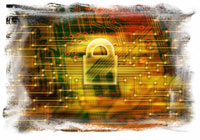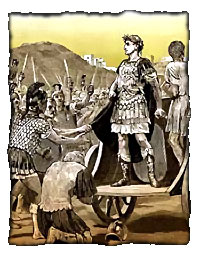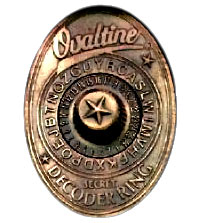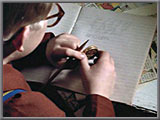Keeping Secrets (Part 1)
(Part 1)
Remember how much fun it was to share secrets with your best
friend? It made you feel very powerful to be privy to "confidential"
information not known by other neighborhood kids or your parents. These top
secrets were usually transmitted to your trusted friend via a whisper.
If you were a pre-geek, maybe you used a code book to
write secret notes to pass.
Well, you're all grown up now, and probably haven't given much thought to
creating secret messages since those innocent days. Maybe you should start.
As more and more of our daily communication occurs through email, shockingly
sensitive information is being sent along with all the chit-chat, jokes, and
recipes. Account numbers, financial details, private business data, client
lists, embarrassing medical records, passwords, and much more are buzzing
around the Internet… completely in the open.
Tomorrow's Headline?
 Despite warnings from the propeller-beanie crowd that email isn't secure and that we
shouldn't email anything we wouldn't mind seeing on the front page of tomorrow's
newspaper, we've been lulled into a false sense of privacy by the nature of our
communications. We sit down and compose a message in private for another person.
The recipient likely will read it without anyone looking over his or her
shoulder. But that message has traveled though many way-stations along its
electronic path from here to there, and is open to anyone with the smarts and
motivation to intercept it. Worse, it also has undoubtedly been stored on
multiple servers, and could be recovered weeks, months, or years later. Ask
those Enron guys.
Despite warnings from the propeller-beanie crowd that email isn't secure and that we
shouldn't email anything we wouldn't mind seeing on the front page of tomorrow's
newspaper, we've been lulled into a false sense of privacy by the nature of our
communications. We sit down and compose a message in private for another person.
The recipient likely will read it without anyone looking over his or her
shoulder. But that message has traveled though many way-stations along its
electronic path from here to there, and is open to anyone with the smarts and
motivation to intercept it. Worse, it also has undoubtedly been stored on
multiple servers, and could be recovered weeks, months, or years later. Ask
those Enron guys.
A Very Bad Day
Still… you may think you're not important enough for anyone to bother
with, that your stuff isn't worth protecting. Wrong. Got a laptop? What's on
it? Everything I'll bet. Your little black book, Quicken files, maybe even
the formula for the "secret sauce" in your business. What would happen if
that laptop disappeared one day? Well, nothing good for you… if it fell into
the wrong hands. You'll wish you paid more attention to what I'm about to
say about encryption technology.
A regular email is absolutely the electronic equivalent of a post card.
You wouldn't write your credit card number on a postcard, why would you send
it in a cleartext email?
Cloak and Dagger
 Encryption,
cryptography, cleartext… it all sounds very cloak and dagger, doesn't it? Yeah,
it does, but I'm here to say that you can easily use some of the same technology
employed by banks, major corporations, governmental agencies, and other
heavy-duty secret-keepers, to secure your communications, protect your private
information, and hack-proof your computer.
Encryption,
cryptography, cleartext… it all sounds very cloak and dagger, doesn't it? Yeah,
it does, but I'm here to say that you can easily use some of the same technology
employed by banks, major corporations, governmental agencies, and other
heavy-duty secret-keepers, to secure your communications, protect your private
information, and hack-proof your computer.
I hope you agree it's time to start "keeping secrets." Luckily, just like when
you were a kid, it's rather fun to do. And interesting. But you have to learn
the basics first. Stay with me for a few minutes and you'll be in great shape
 From
Tactical to Practical
From
Tactical to Practical
First the background: Julius Caesar was one of the first people to
encrypt his communications. In those days, the only way for an emperor to
communicate with his far flung generals was by sending written messages via a
courier. If the courier was captured before he could eat the scroll, or was
bribed, there was great danger the message could revealed. So Caesar did
something clever (for the day). He developed a cipher. A cipher is a way of
converting plain readable text, or cleartext, into scrambled, unreadable
gibberish, or cyphertext. He did this in a simplistic way, by shifting each
character three spaces to the right. So an A became a D, a B became an E, and so
on. Thus, the word Cat became Fdw. The "key" to this encryption method was a
single number. In this case, the digit three. A recipient of the scrambled
message would only have to know that single item of information to decipher the
emperor's orders. Simplistic sure, but it was extremely effective for the day.
 Mystery
Message
Mystery
Message
Caesar's cipher was also the basis of the Ovaltine secret decoder ring,
immortalized by little Ralphie in Jean Shepard's classic: "A Christmas Story."


Drink more Ovaltine! It doesn't take long for the marketers to seize on any
opportunity to promote their product, does it? In reality, that was never one of
the actual secret Annie messages. But it makes a great story.
So What?
At this point however, you're probably saying, "Victor this is all very
interesting, but what can I do with it?" Good question. The answer is "not
much." Well, not much directly. But when you learn how to use some simple tools
based on more advanced levels of encryption, you'll be able to do everything I
promised at the beginning of this article: send and receive truly secure emails,
keep private documents private, and make your stolen laptop totally useless to
anyone else. Those secrets will be revealed to you in the next Urbach Letter (or
two).
Stay tuned.
 (Part 1)
(Part 1)

 Despite warnings from the propeller-beanie crowd that email isn't secure and that we
shouldn't email anything we wouldn't mind seeing on the front page of tomorrow's
newspaper, we've been lulled into a false sense of privacy by the nature of our
communications. We sit down and compose a message in private for another person.
The recipient likely will read it without anyone looking over his or her
shoulder. But that message has traveled though many way-stations along its
electronic path from here to there, and is open to anyone with the smarts and
motivation to intercept it. Worse, it also has undoubtedly been stored on
multiple servers, and could be recovered weeks, months, or years later. Ask
those Enron guys.
Despite warnings from the propeller-beanie crowd that email isn't secure and that we
shouldn't email anything we wouldn't mind seeing on the front page of tomorrow's
newspaper, we've been lulled into a false sense of privacy by the nature of our
communications. We sit down and compose a message in private for another person.
The recipient likely will read it without anyone looking over his or her
shoulder. But that message has traveled though many way-stations along its
electronic path from here to there, and is open to anyone with the smarts and
motivation to intercept it. Worse, it also has undoubtedly been stored on
multiple servers, and could be recovered weeks, months, or years later. Ask
those Enron guys.  Encryption,
cryptography, cleartext… it all sounds very cloak and dagger, doesn't it? Yeah,
it does, but I'm here to say that you can easily use some of the same technology
employed by banks, major corporations, governmental agencies, and other
heavy-duty secret-keepers, to secure your communications, protect your private
information, and hack-proof your computer.
Encryption,
cryptography, cleartext… it all sounds very cloak and dagger, doesn't it? Yeah,
it does, but I'm here to say that you can easily use some of the same technology
employed by banks, major corporations, governmental agencies, and other
heavy-duty secret-keepers, to secure your communications, protect your private
information, and hack-proof your computer. From
Tactical to Practical
From
Tactical to Practical Mystery
Message
Mystery
Message
